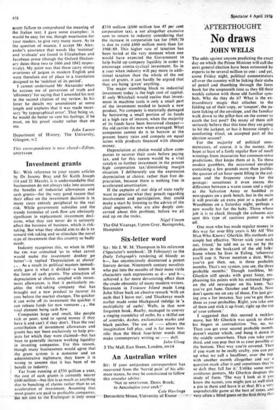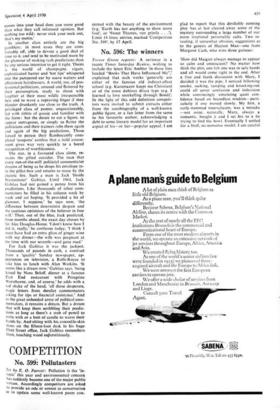AFTERTHOUGHT
No draws
JOHN WELLS
The odds against anyone predicting the exact day on which the Prime Minister will call the next general election have been estimated by experts to be several million to one: and yet, come Friday night, political commentators all over the country will be licking their stubs of pencil and thumbing through the form book for the umpteenth time as they fill their weekly column with those old familiar sym- bols. Why do they do it? What is the ex- traordinary magic that attaches to the folding up of their copy, or 'coupon', the pa- tient licking of the envelope, and the familiar walk down to the pillar-box on the corner to catch the last post? Do many of them still seriously believe that this time they are going to hit the jackpot, or has it become simply a comforting ritual, an accepted part of the election season?
For the majority of political com- mentators, of course, it is the money, the hope at least of a fairly regular flow of small winnings from inaccurate but common-sense predictions, that keeps them at it. To these modest gamblers, the occasional envelope containing a few pounds more than justifies the quarter of an hour spent filling in the col- umn and the fivepenny stamp for the postage : sometimes it even means the difference between a warm room and a night at the Salvation Army or huddled in newspapers on a park bench, but in the main it will provide an extra pint or a packet of Woodbines on a Saturday night, perhaps a new woolly hat for the baby. Those whose job it is to check through the columns can spot this type of cautious punter a mile off.
One man who has made regular money in this way for over fifty years is Mr Alf 'The Man Who Knows' Gherkin. His methods are simple but effective. 'Never stick your neck out, friend,' he told me as we sat by the dustbins in the backyard of the old folks' home where he lives in Ealing, 'otherwise you'll cop it. Never mention a date. What you've got then, see, is three probable months. That's my system, you see, the three probable months.' Though toothless, Mr Gherkin still speaks with great force, em- phasising his points with his mittened fingers on the old newspaper on his knee. 'Say you've got June, October and March. Now don't quote me on any of those, I'm just giv- ing you a for instance. Say you've got those three as your probables. Right, you take one of them and stick it up front, right up the top of your column.'
I suggested that this seemed a reckless move, but Mr Gherkin was quick to shake his fingers in contradiction. 'No, no, no. Then you get your second probable month. doesn't matter which, and bung it down in the middle somewhere. Then you take your third, and you pop that in as your possible at the bottom. That way you're covered. Then if you want to be really crafty, you can put up what we call a headliner, over the top. with another month altogether and say a question mark after it and sometimes they're so daft they fall for it.'. Unlike some more assiduous punters, Mr Gherkin despises the study of form. 'The way I look at it you know the names, you might just as well stick a pin in them and leave it at that. It's a veil unpredictable game at the best of times, and very often a blind guess or the first thing that
comes into your head does you more good than what they call informed opinion. But nothing too wild: never stick your neck out, that's my motto.'
In another class entirely are the big gamblers: in most cases they are com- fortably off, able to devote a good deal of time to it, and tend to be motivated more by the glamour of making rash predictions than by any serious intention to get it right. Theirs is the world of champagne, cigars, sophisticated banter and 'hot tips' whispered into the pampered ear by suave waiters and effeminate hairdressers. A world, too, of pro- fessional politicians, amused and flattered by their presumption, ready to shout with laughter at their most ,wildly irresponsible bets and to wave a reproving finger if they blunder drunkenly too close to the truth. A privileged class of punter, unquestionably, fed with titbits of gossip and familiar with the form: but the desire to cut a figure, to appear outrageous, or simply to flatter the politicians and their trainers robs them again and again of the big predictions. Those forced to peruse their flamboyantly com- pleted 'coupons' confess that a mild amuse- ment gives way very quickly to a bored recognition of worthlessness.
The star, in a favoured class alone, re- mains the gifted outsider. The man that every run-of-the-mill politicial commentator dreams of being as he drops his envelope in- to the pillar-box and returns to muse by the electric fire. Such a man is Jack 'Inside Westminster' Gabitas. Until 1964, Jack Gabitas had not gained a penny from his predictions. Like thousands of other com- mentators he filled in his column week by week and sat hoping. 'It provided a bit of glamour, I suppose,' he says now, 'the difference between determinist despair and the cautious optimism of the believer in free will.' Then, out of the blue, Jack predicted, three months ahead, the exact day chosen by Sir Alec Douglas-Home. 'I don't know how I did it, really,' he confesses today, 'I think I must have had an extra glass of ginger wine with my dinner—the wife was pregnant at the time with our seventh—and gone mad.'
For Jack Gabitas it was the jackpot. Thousands of pounds in cash, a contract from a 'quality' Sunday newspaper, ap- pearances on television, a Rolls-Royce to take him to lunch with Alan Watkins. 'It seems like a dream now,' Gabitas says, 'being kissed by Nora Beloit dinner at a famous East End restaurant with Peregrine Worsthorne, and, of course,' he adds with a sad shake of the head, 'all those desperate, tragic letters from derelict commentators asking for tips or financial assistance.' And to the great unheeded army of political com- mentators, it remains a dream. But a dream that will keep them scribbling their predic- tions as long as there's a stub of pencil to write with or a butt of candle to warm their hands by. And' sitting with his crocodile-skin shoes on the fifteen-foot desk in his huge Fleet Street office, Jack Gabitas remembers them, touching wood superstitiously.



































 Previous page
Previous page